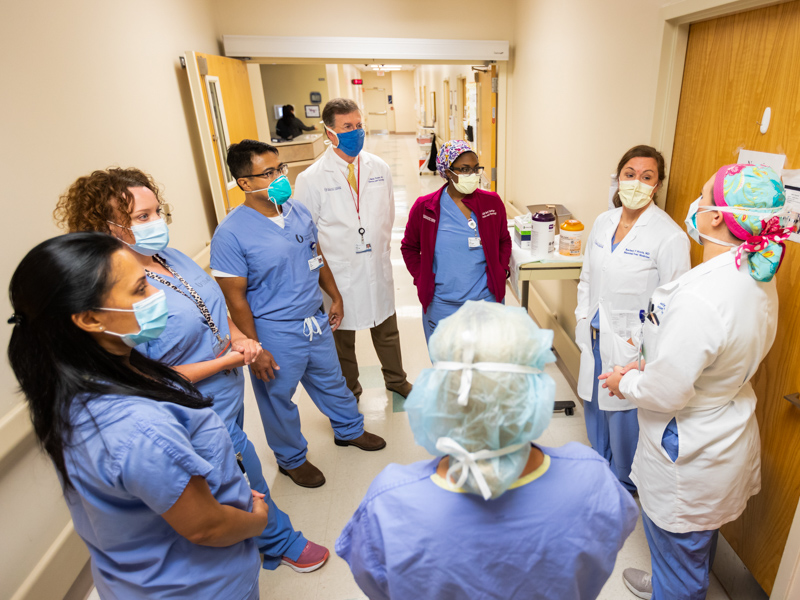Experts debunk misinformation about vaccine, pregnancy

Getting the COVID-19 vaccine will NOT affect someone’s fertility or make them sterile.
Getting the COVID-19 vaccine has NOT shown to be dangerous or harmful to a pregnant woman or her unborn baby, or to a mother and her breast-fed baby.
Getting the COVID-19 vaccine, however, WILL outweigh any possible or potential adverse events because it will help both pregnant and non-pregnant women to avoid severe COVID-19 disease, including the highly contagious Delta variant.
Those science-based determinations, not social media posts or political rhetoric, should drive decisions about receiving the vaccine, UMMC experts and national obstetrics and gynecology leaders say.

An advisory from the American College of Obstetricians and Gynecologists, updated on July 2, gives key information and recommendations to women, including those who are pregnant, said Dr. J. Martin Tucker, professor and chair of the University of Mississippi Medical Center’s Department of Obstetrics and Gynecology. Tucker serves as president of the association, ACOG for short.
Key points ACOG emphasizes for pregnant, recently pregnant and non-pregnant women include:
- Pregnant women should have access to the vaccine and to education about its effectiveness and its safety for pregnant women and their unborn babies.
- Claims linking COVID-19 vaccines to infertility are unfounded and have no scientific evidence supporting them.
- Claims linking the vaccine to contracting COVID-19 “are unfounded and have no scientific evidence supporting them,” ACOG says. The College strongly recommends everyone receive COVID vaccination, including those planning future pregnancy
- Data shows that people who have received any of the three U.S. approved COVID-19 vaccines have not had any increased complications with pregnancy compared to before the pandemic began.
- For patients who decline the vaccine, “providers should reinforce the importance of other prevention measures, such as handwashing, distancing and wearing a mask.”
- Expected side effects “should be explained as part of counseling patients, including that they are a normal part of the body’s reaction to the vaccine and developing antibodies to protect against COVID-19 illness.”
“ACOG strongly recommends that all eligible persons receive a COVID-19 vaccine or vaccine series, depending on the product,” the advisory states. “Obstetrician-gynecologists and other women’s health care practitioners should lead by example by being vaccinated and encouraging eligible patients to be vaccinated as well.”
Studies show the Moderna and Pfizer COVID-19 vaccines carry no increased risk for miscarriage, premature births and other complications. Additional studies have shown that transfer of maternal antibodies across the placenta and into breast milk confer passive immunity against SARS-CoV-2 in newborns after maternal vaccination.
As the pandemic ramped up in June 2020, the Centers for Disease Control and Prevention released a statement confirming that pregnant women are in a higher risk category for a COVID-19 infection, said Dr. Rachael Morris, associate professor of obstetrics and gynecology whose specialty is maternal-fetal medicine.

“One year later, we have seen and felt this morbidity and mortality,” Morris said. “Pregnant women are more likely to be hospitalized, to be intubated, to need ECMO, and more likely to die compared to non-pregnant people.”
The best prevention is the COVID-19 vaccine, she said. Data from more than 35,000 vaccinated women showed no additional risk factors.
“Yes, we need longer longitudinal studies, but we don’t have the luxury of the time it will take to wait,” Morris said. “We also have good studies to show babies born to mothers after vaccination have some immunity to COVID-19, like other vaccines we give to mothers during the third trimester.”
Regardless of pregnancy, all people should limit their risk of COVID-19 exposure in order to protect themselves and others around them, Tucker said.
“We all need to follow the recommendations given to us by public health agencies, our government authorities and our employers,” Tucker said. “Follow the advice from your doctors and health care providers.”
The Society of Maternal Fetal Medicine highly encourages pregnant and lactating women to receive the vaccination, saying the benefits and potential of avoiding severe COVID-19 disease during pregnancy outweigh any potential adverse events.
Researchers and maternal-fetal medicine organizations continue to monitor available data on COVID-19 vaccine efficacy and safety to ensure continued appropriateness during pregnancy or breastfeeding.
“It’s always best to speak to your OB-GYN if you have any specific questions or concerns,” Morris said.


